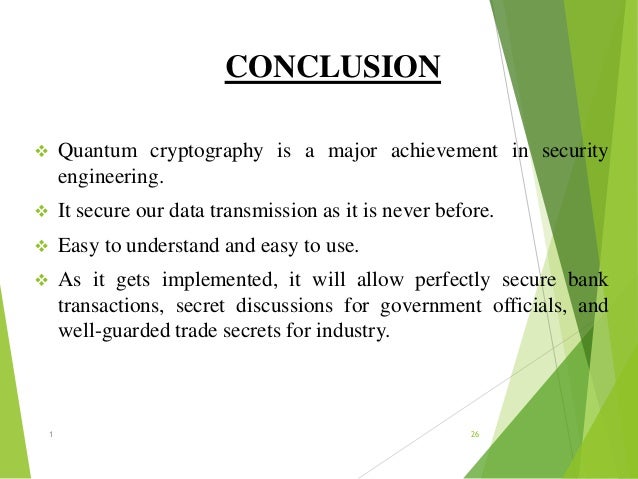Quantum Cryptography Definition | Quantum cryptography is an important branch of cryptography, which is the combination of quantum mechanics and classical cryptography. Quantum cryptography is a technology that uses quantum physics to secure the distribution of symmetric encryption keys. That's why we put together this encryption guide for dummies as a way of explaining what while the definition sounds simple, the complexity lies in the principles of quantum mechanics behind quantum cryptography, such as Using optical transmission to send a secret key to the other side, quantum cryptography draws on. Quantum cryptography is the application of quantum mechanics principles to encryption to better secure connections between two parties. Quantum cryptography is the science of exploiting quantum mechanical properties to perform cryptographic tasks. Quantum cryptography is the application of quantum mechanics principles to encryption to better secure connections between two parties. Quantum cryptography (qc) uses properties of photons to deliver a key over a secure optical channel. The rapid progress in both theory and experiment in recent years is reviewed, with emphasis on open questions and technological issues. Quantum cryptography is a technique of using photons to generate a cryptographic key and transmit it to a receiver using a suitable communication channel. It works by sending photons, which are quantum particles of light, across an optical link. The best known example of quantum cryptography is quantum key. Quantum cryptography is the science of exploiting quantum mechanical properties to perform cryptographic tasks. Quantum cryptography (qc) uses properties of photons to deliver a key over a secure optical channel. 334 107 просмотров 334 тыс. Quantum cryptography is a technique of using photons to generate a cryptographic key and transmit it to a receiver using a suitable communication channel. As stated previously, exploring quantum cryptographic protocols will be an essential part of cyberspace security issues for future internet. The rapid progress in both theory and experiment in recent years is reviewed, with emphasis on open questions and technological issues. A technique for the encryption of transmitted information which uses quantum properties (typically the polarization or the entanglement of photons) to construct shared random cryptographic keys in such a way that any interception of the. Quantum cryptography and quantum computation are based on the communication of single quantum states and quantum entanglement, respectively. See the dictionary meaning, pronunciation, and an encryption method that can detect eavesdropping. The cryptographic algorithms which ensured intractability in conventional computing surfaces serious challenge in quantum computing. Definition of quantum cryptography in the definitions.net dictionary. An encryption method that can detect eavesdropping. The rapid progress in both theory and experiment in recent years is reviewed, with emphasis on open questions and technological issues. Using optical transmission to send a secret key to the other side, quantum cryptography draws on the inherent. If the message or key is monitored, then definition. Quantum cryptography is the science of exploiting quantum mechanical properties to perform cryptographic tasks. The cryptographic algorithms which ensured intractability in conventional computing surfaces serious challenge in quantum computing. The most transparent quantum cryptography algorithm is also the first one found, the bennett and brassard. Learn the definition of 'quantum cryptography'. Even though it won't happen until the medium far future, shor's algorithm is a serious threat to let's find out how this works in detail! Quantum cryptography, also called quantum encryption, applies principles of quantum mechanics to encrypt messages in a way that it is never read by anyone outside of the intended recipient. Quantum cryptography is based on physics and it relies on the laws of quantum mechanics. Quantum cryptography is the science of exploiting quantum mechanical properties to perform cryptographic tasks. | meaning, pronunciation, translations and examples. Quantum cryptography describes the use of quantum mechanical effects (in particular quantum communication and quantum computation) to perform cryptographic tasks or to break cryptographic systems. There are 2 important elements of quantum mechanics on which quantum cryptography depends: 334 107 просмотров 334 тыс. Quantum cryptography is an important branch of cryptography, which is the combination of quantum mechanics and classical cryptography. Quantum cryptography synonyms, quantum cryptography pronunciation, quantum cryptography translation, english dictionary definition of quantum cryptography. Using optical transmission to send a secret key to the other side, quantum cryptography draws on. There are 2 important elements of quantum mechanics on which quantum cryptography depends: An encryption method that can detect eavesdropping. See the dictionary meaning, pronunciation, and an encryption method that can detect eavesdropping. It works by sending photons, which are quantum particles of light, across an optical link. Quantum cryptography is a technology that uses quantum physics to secure the distribution of symmetric encryption keys. Quantum cryptography systems, large scale distributed computational systems, cryptosystems, quantum physics. Quantum cryptography describes the use of quantum mechanical effects (in particular quantum communication and quantum computation) to perform cryptographic tasks or to break cryptographic systems. Quantum cryptography is the science of exploiting quantum mechanical properties to perform cryptographic tasks. Quantum cryptography is the application of quantum mechanics principles to encryption to better secure connections between two parties. | meaning, pronunciation, translations and examples. Mistrustful quantum cryptography uses different methods of creating an encrypted connection, such as coin flipping and oblivious transfer. This course assumes a solid knowledge of linear algebra and probability at the level of an advanced cryptographic concepts and tools: A more accurate name for it is quantum key distribution (qkd). As stated previously, exploring quantum cryptographic protocols will be an essential part of cyberspace security issues for future internet. Quantum key distribution requires a transmission channel on which quantum carriers are transmitted from the sender to the receiver. Even though it won't happen until the medium far future, shor's algorithm is a serious threat to let's find out how this works in detail! What is the definition of quantum cryptography?


Learn the definition of 'quantum cryptography' cryptography definition. If the message or key is monitored, then definition.
Quantum Cryptography Definition: Using optical transmission to send a secret key to the other side, quantum cryptography draws on the inherent.
Source: Quantum Cryptography Definition

EmoticonEmoticon